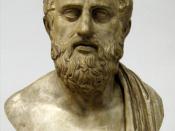Sophocles: The Legend of Greek TragedySophocles, perhaps more than any other Athenian author, typified the ancient Greek ideal that a man, no matter what his other ambitions and accomplishments, should live fully in the present (Robinson 1). Sophocles exemplified living in the present. He was involved in many different activities, from civic duties to various capacities in the state. He has been called the quintessence of the Greek, the great tragedian, and he has become immortal within the realm of Greek poets. The spirit of Sophocles is the strife to understand the irresistible movement of events, and man's helplessness as far as fate is concerned (Hamilton 258-59). This strife for knowledge is the driving force behind Sophocles' great tragedies. Aristotle wrote, "Tragedy should be a serious and complete imitation of action; it should arouse pity and fear and provide a catharsis, or purging of these emotions" (Robinson 3).
In ancient Greece, dramas were performed each year in Athens as part of the festival of Dionysius, the god of wine, vegetation, religious ecstasy, the mask, and the theater. Tragedies were introduced relatively late in the history
of the Athenian theater, probably in the 430's (Segal 36-37). The entire process of Greek tragedy production was in the hands of the author.
The staging of the plays was simple. The circular performance area was backed by a long, low building with a slightly raised platform in front of it. Compared to modern plays, the stage was bare. There were few props, and only three male actors per play. The plays were performed from beginning to end without an intermission (Segal 38-39). The simplicity of the staging and the lack of props allowed the imagination of the audience to run wild. Sophocles used all aspects of Greek theater, including the...


